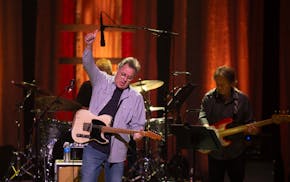While Morgan Wallen is dropping double albums about his moping, Garth Brooks is chasing sales records and Kenny Chesney is obsessed with partying in stadiums, Vince Gill is "sadly normal," as he puts it.
The Country Music Hall of Famer just shows up with his band and plays music without putting on any airs. He doesn't need any bells and whistles. He is the most well-rounded talent in Nashville besides Chris Stapleton, but Gill has been doing a solo thing for 30 years longer than Mr. Tennessee Whiskey. Gill has 22 Grammys — the most for a male country artist — and 18 Country Music Association awards, one fewer than the record held by Stapleton and Brooks & Dunn.
Gill is so highly regarded that the Eagles hired him to help fill the void after the death of Glenn Frey in 2017. It turned out the Eagles got not only the angelic voice they expected but a hellacious guitar player that they didn't know about.
After nine years touring with the Eagles, Gill finally returned to his solo career this spring before he rejoins Don Henley and company in the fall. On Thursday, for a Springsteenian 195 minutes at the sold-out Orpheum Theatre in Minneapolis, Gill and his band delivered a satisfying if exhausting program of country music like the kind Nashville used to make in the '90s and earlier.
Here are eight takeaways from the marathon concert.
Generosity. Gill was very generous in multiple ways. His first set featuring 21 selections in 1¾ hours was as long as most headline shows, period. And he performed for another 90 minutes after intermission, with 35 tunes all told. (By comparison, he offered 29 songs in his last Twin Cities solo gig, in 2019.) Moreover, he gave six of his 10 band members moments in the spotlight for solos, most notably pedal steel guitarist Eddie Dunlap ("he makes our band country") and harmony singer Wendy Moten, whose lead vocal turn on Bobbie Gentry's "Ode to Billie Joe" was rivetingly soulful.
That voice. At age 68, Gill hasn't lost anything vocally. He still shines with that gorgeous high tenor. No wonder the Eagles coveted him. With that heavenly voice, he sounded touchingly passionate Thursday on the reverent "When My Amy Prays," a tribute to his wife Amy Grant during which he held a guitar but didn't play it (for the only time all night). And he made "Go Rest High on That Mountain," a bluegrassy eulogy to his late brother, feel deeply spiritual even if you aren't religious.
Those guitar heroics. There were six guitarists in the band, seven if you count the bass guitarist. Gill's electric guitar work was more expressive than expansive, including his speedy chicken pickin' runs on "Oklahoma Borderline," hot rock licks on "What the Cowgirls Do," some B.B. King lonely blues on the Patsy Cline-evoking "If You Ever Have Forever in Mind," his extended Allmanesque solo on the end of "Pretty Little Adriana" and his bluesy swag on "Don't Let Our Love Start Slippin' Away."
That funny bone. Gill's comfortably casual manner (jeans, unbuttoned Western shirt over a T-shirt) and easy, self-deprecating humor added to the audience's enjoyment even if he tells the same jokes night after night (which is maybe why the band members never laugh). His enthusiasm and timing were delightful as he joked often about his weight, which has fluctuated, and his career ups and downs. "I'm drawn to sad songs. They bought my house. So I'm not going to stop singing 'em."
Sense of place. He mentioned the Minnesota State Fair once but pork chop on a stick three times. He also gave a shout out to the Mall of America and Jucy Lucy, which he's had in Minneapolis. More than once, he mentioned that he likes to eat.
Pacing. The first set was an almost unimprovable mix of hits, a couple deep tracks, covers of his heroes (Merle Haggard's "The Bottle Let Me Down" and Buck Owens' "Together Again"), a blues-rocker "Guitar Slinger" to pick up the tempo, and solo numbers by Moten and guitarist Jedd Hughes. However, the second segment started with eight, new unfamiliar numbers. Thankfully, Gill shared back stories about many of them, which helped listeners better appreciate unknown lyrics, but several brand-new ballads in a row doesn't always hold an audience's attention. Inserting a hit between three newbies might have been more effective.
New songs. Some were highly personal like "Made Me," a wistful reflection on pivotal things in Gill's own life, and the haunting, minor-key "Benny's Song," written after his best friend since 6th grade died, that felt like Gill's answer to Eric Clapton's "Tears in Heaven." There were a few social commentary selections, not usually Gill's oeuvre. The best of them was "Some Times," a reflection on the civil rights struggles he has witnessed in his lifetime.
The Eagles. He didn't mention the Eagles by name but he did tack on a taste of the guitar solo from that group's "I Can't Tell You Why" to the end of "Down to My Last Bad Habit." Afterward he said, "That was a little tribute to my rock band." Nicely underplayed.

Review: Vince Gill's Minneapolis marathon showcases hits, humor, guitar heroics

Excerpt: Former Star Tribune writers' poetic book views what's happening to American prairie

Eagan's Eva Erickson doesn't think RFK Jr. would last a day on 'Survivor'
The National's Matt Berninger won't have to 'climb the rafters' in Minneapolis on solo tour

